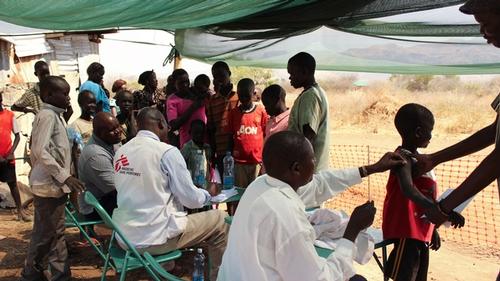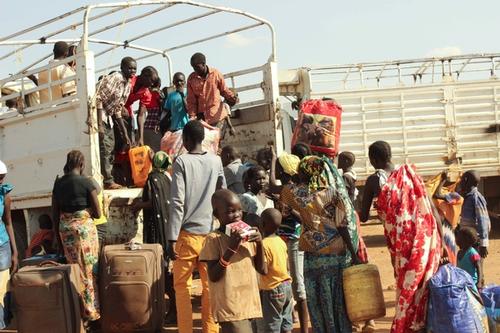Every day, more than 1,000 South Sudanese refugees are fleeing the fighting in their home country, crossing into Kenya, Ethiopia and Uganda, where emergency teams from Médecins Sans Frontières (MSF) are providing medical and humanitarian aid.
In just one month, more than 89,000 people, mostly women and children, have been forced to leave their homes behind, often making long journeys on foot, by bus or by truck, taking with them only what they can carry. Some families arrive at the border with nothing; many are in need of food, water, shelter and medical care.
Uganda
“Most of the refugees in Uganda fled the fighting in Bor, and walked for four or five days to reach Juba, where they took a bus or truck to the border,” says Ruben Pottier, MSF’s head of mission in Uganda, which is now home to 46,000 South Sudanese refugees. “It really strikes you when you walk around the camp that there are very few men,” says Pottier.
More than 25,000 refugees are crammed into the Dzaipi settlement, a camp built for just 3,000 people. It is hot and dusty, and living conditions are terrible for those who are sheltering under the trees or inside a school. “We are treating serious cases of malaria, diarrhoea, and respiratory tract infections,” says MSF’s Dr Fredericke Dumont. “There are women suffering complications during pregnancy and some cases of malnutrition.”
20,000 people from Dziapi are set to be accommodated in a permanent camp in Numanzi, and there are plans to build three more camps in the coming weeks. MSF is currently setting up water and sanitation facilities, running inpatient and outpatient services, providing maternity care, vaccinations and nutrition support to refugees in Uganda. As new camps are built, MSF will expand its activities.
“Because there are now large numbers of people living in a region that has frequent epidemics of cholera and meningitis, we will be closely monitoring the health situation in the camps,” says Pottier.

Kenya
Around 10,000 South Sudanese refugees have fled to neighbouring Kenya, where MSF is working at the Nadapal border crossing. Some arrive tired, hungry and dehydrated; others have sold what few personal belongings they were carrying in order to pay for transport.
“When people cross the border there is relief and often hope,” says Guilhem Molinie, MSF’s head of mission in Kenya. “But you can see that people are used to tough realities. At the border I met a refugee who was pleading with officials to let him back into South Sudan. He wanted to find his mother, who was blind. I met another family who had been so scared before they left home that they had hidden under a bed for seven days.”Tok Maker Tot, 20, fled Juba with his mother and ten siblings after witnessing the shooting of some students at his university. His father stayed behind in the city. “Two students from our class were shot,” says Tot. “All the students have now fled. Those who have money have gone to Nairobi, others went to Kampala, others went to Ethiopia. But we, who do not have anything, are trying to go to Kakuma [a refugee camp in northwestern Kenya].”
MSF is working with the Kenyan Ministry of Health to screen all refugees arriving at Nadapal for measles. So far, the team has screened 6000 people, and vaccinated more than 1000 children against measles and polio. Seven suspected cases of measles have been referred to the local hospital for treatment. “With cases of measles reported at the camps in Juba, where most of these refugees transited through, it is of the utmost importance that we do all that we can to prevent an outbreak in Kenya” says Molinie.
As well as providing medical care, MSF has distributed more than 11,000 litres of water to the refugees in Nadapal.
Ethiopia
In neighbouring Ethiopia, in the coming weeks MSF will provide outpatient services, maternity care, immunisations and nutrition care to 5,500 refugees who have settled temporarily in Tirgol, and will continue to provide these services once they are moved to a permanent camp in Leichure, which is currently under construction.



